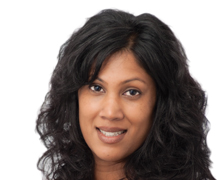In life I follow two basic principles: The first principle is to succeed in spite of, not because of something. The second is to seek to understand before you seek to be understood. As a female, visible minority, I was often stereotyped, limiting my potential. This inspired me to seek opportunities, such as completing my PhD, to demonstrate my ability. Through others, I learned that my value lies in being able to listen and create opportunity for people to succeed. I became determined that if ever I was in a position of influence, I would influence people to see difference as an advantage.
As an HR Director, I now have that influence. I believe that our society, and in particular, our workplace, can take one of two potential approaches. One emphasizes an assimilation concept and the belief that Western culture is superior. This reinforces traditional definitions of normality and the belief that differences are unacceptable.
There is another approach. It recognizes and values diversity, challenging us to accept multiple cultures, develop new perspectives, and teach others how to integrate broad and conflicting bodies of information to arrive at the soundest of judgments. It is through this that we begin developing structures, policies, and practices that are more inclusive to all groups, regardless of ethnicity, gender, ability, or religious affiliation.
The latter approach is not easy. It has its challenges and uncertainties and demands openness to change.
The demographics of our workforce are changing at a rate unmatched by history. Companies need to respond to this by creating an environment that can not only match that change but lead it. Human resources impact that change and are a vital link between the strategic and operational functions in an organization. Crucial to this are people and relationships. It is about developing connections with people that make them want to work in a company and contribute. This involves teamwork and establishing systems that provide employees with a meaningful voice in decisions that affect them. Alan Loy McGinnus states that there is no more noble occupation in the world than to assist another human being, to help someone succeed. I have the opportunity to do that every day.
How has education affected your career?
Without it I would not be where I am today. With it I am sought out, both because my opinions matter and they are supported through the education I have been blessed to have. It has provided me credibility as a professional in a field that can be highly scrutinized.
What does it take to succeed and stay competitive in your position/field?
Know the business, and then HR. Be able to anticipate and respond, not react. Speak with conviction and recognize what you know and learn from what you do not.







